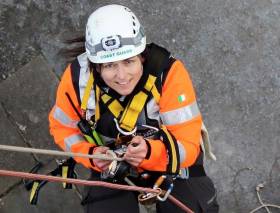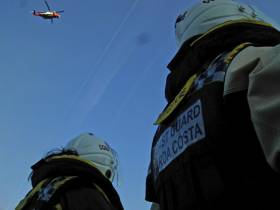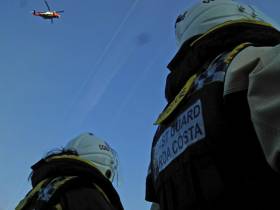Displaying items by tag: Aoife Winterlich
Late Coastguard Volunteer Caitriona Lucas Awarded Irish State’s Highest Award For Bravery
#Coastguard - The late Irish Coast Guard volunteer Caitriona Lucas has been recognised in this year’s National Bravery Awards.
The Posthumous Gold Medal and Certificate of Bravery were presented to Lucas’ family at Farmleigh House yesterday (Friday 20 October) a year after she died during a search operation in Kilkee when her RIB capsized.
“Catriona’s courage and selfless action on that day says everything about her — her strength of character and spirit and willingness to help others,” said Ceann Comhairle Seán Ó’ Fearghaíl, who presented the awards to 15 recipients.
“It is also a reminder of how committed and brave members of our emergency services put their lives on the line on a daily basis to help and protect their communities.
“Caitriona’s family accepted a Gold Medal for Bravery in recognition of her courage, which is the highest award possible.”
Others recognised at the ceremony yesterday include Darren McMahon, who was awarded a Certificate of Bravery for his attempt to rescue his brother from a kayak trapped in a weir gate in Ennis.
Bronze Medals and Certificates of Bravery also went to scouts Sean Baitson, Kyle Corrigan, Cory Ridge Grenelle and Philip Byrne for their attempts to rescue 14-year-old Aoife Winterlich, who died after being swept into the sea during an outing at Hook Head Lighthouse in December 2015.
Byrne in particular was noted for his efforts to keep Winterlich afloat in the rough waters before help arrived.
Fall From Helicopter Winch ‘Unlikely’ To Have Led To Death In Hook Head Rescue Tragedy
#Coastguard - The Irish Coast Guard crew winching two teenagers from the sea when one fell from her harness had never lifted two casualties at the same time before, as BreakingNews.ie reports.
Aoife Winterlich, 14, was one of four teenagers who had been swept into the sea off Hook Head during an outing for venture scouts on 6 December 2015.
Two managed to swim ashore but Winterlich got into difficulty in heavy seas. The fourth, a 15-year-old boy, attempted to keep her afloat until rescue arrived minutes later.
It was when Rescue 117’s crew attempted to transfer the pair into the helicopter that Winterlich slipped from her strop some 45 feet back into the water.
Records show that the winchman was back in the water to retrieve Winterlich within moments, and that she was in the helicopter just over a minute after.
The inquest into Winterlich’s death this week heard that she died from lack of oxygen to the brain resulting from near drowning, and that there was no evidence of contributing physical trauma.
Prof Maureen O’Sullivan of Our Lady’s Children’s Hospital in Crumlin, who conducted the post-mortem, said the fall was unlikely to have contributed to Winterlich’s death, according to RTÉ News.
The inquest also heard that the coastguard helicopter’s winchman and winch operator had never performed a lift of more than one casualty in a single lift.
Winch operator Neville Murphy told Dublin Coroner’s Court the situation that led his college Sean Jennings to descend with two winch strops was “unprecedented”.
“Two people in the water, that generally doesn’t happen,” he said. “We can only train to certain limits. We can never know what we are faced with as we look out the door of the aircraft.”
Earlier this year, the Air Accident Investigation Unit report into the incident concluded there was “nothing to suggest that the winchman’s decision-making was anything other than sound”.
The inquest is adjourned till October. BreakingNews.ie has more on the story HERE.
#Coastguard - The actions of a helicopter winchman during an incident in which a 14-year-old girl rescued from the sea fell back into the water have been found to be “sound” by an official investigation.
Aoife Winterlich died in hospital days after she and three other venture scouts were swept into the sea off Hook Head during an outing on 6 December 2015, as previously reported on Afloat.ie.
Two managed to swim to shore but Winterlich got in difficulty amid heavy seas, and the fourth youth, a 15-year-old boy, remained to keep her afloat till the Waterford-based Irish Coast Guard helicopter Rescue 117 arrived.
Severe conditions prompted the winchman to lift both teenagers from the water at the same time. As the three reached the helicopter, Winterlich slipped from her strop some 45 feet back into the water.
Records show that the winchman was back in the water to retrieve Winterlich just half a minute after reporting her fall, according to the Air Accident Investigation Unit Report as covered in The Irish Times.
Tragically, however, she died four days later at Our Lady’s Children’s Hospital in Crumlin.
“In the circumstances of this particular rescue, there is nothing to suggest that the winchman’s decision-making was anything other than sound,” the report said.
The Irish Times has more on the story HERE.
Inquiry Launched Into Rescue Incident As Teen Dies After Hook Head Tragedy
#Coastguard - The Air Accident Investigation Unit is conducting an inquiry after it emerged one of two teenagers recovered from the sea off Hook Head last weekend fell from a coastguard helicopter back into the water.
The Irish Times reports that 14-year-old Aoife Winterich died in hospital days after she and three other venture scouts were washed into the sea by a surprise wave during the last remnants of Storm Desmond.
As previously reported on Afloat.ie, two of the group managed to swim to shore, but Winterlich and a 15-year-old boy got into difficulty in what the Irish Coast Guard described as "confused" heavy seas.
The boy reportedly kept the unconscious Winterlich afloat until the coastguard's Waterford-based helicopter Rescue 117 arrived at the scene, and both were flown to hospital within 17 minutes of the callout.
However, it's been reported that during the winching process, which required both teens to be lifted from the water simultaneously due to the severity of conditions, Winterlich fell out of the rescue strop back into the sea – a drop of some 40 feet, according to Mail Online.
On Monday Scouting Ireland said it was launching its own review into whether there were "things that could have been done to make the trip safer". The Irish Times has more HERE.































































